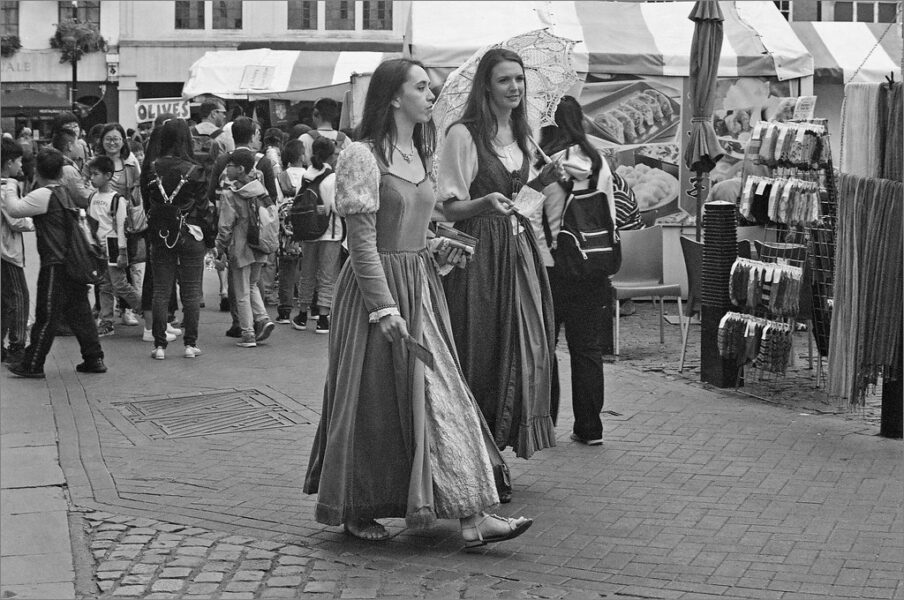
Image: frscspd, Flickr
During summer in Cambridge, it is not uncommon to see people walking around town in Renaissance clothing. Why? They are actors advertising the Cambridge Shakespeare Festival, which takes place over July and August and celebrated its 36th year this summer.
Over the course of the festival, a range of Shakespeare’s plays are performed in the gardens of Cambridge colleges as the sun sets, making for a beautiful natural setting. This adds to the historical feel of shows as – unlike many of the Shakespeare productions that can be found today – the productions of the Cambridge Shakespeare Festival are set when they were written, that is, in the Elizabethan era.
In the gardens, half the audience sits on chairs, while the other half sits on picnic blankets in front, and, as the gardens are opened an hour before the show starts, many audience members arrive early with dinner and snacks, and often a bottle of wine to enjoy as they watch. Something I noticed was that if an actor likes the look of your snacks, they might scheme to steal some of it for themselves: during The Tempest, an evil henchman character stabbed a strawberry from a punnet with their rapier, before eating it off the end of the sword (if you are going to improvise, of course you need to stay in character).
Many audience members arrive early with dinner and snacks, and often a bottle of wine to enjoy as they watch.
The first show I saw at the festival was Much Ado about Nothing, which was amazing. With a great and effortlessly comedic cast, from the central romance between Benedick and Beatrice and their witty banter to the bumbling Don John who was laughably incompetent at being evil, the Cambridge Shakespeare show solidified Much Ado’s place as my favourite Shakespeare play due to its sheer hilarity. They also tried to involve the audience as much as possible, even at points getting members of the audience on stage briefly.
The open-air aspect of the festival is delightful, with birds and dragonflies flitting about the sky as the plays are performed, however, this doesn’t always work in its favour. English summertime can usually be characterised by grey skies and dreary weather and Cambridge is no exception. As I sat down waiting for Much Ado to start, the sky clouded over and before we knew it, we were in the midst of a thunderstorm which sent me and most of the rest of the audience running for cover. Most of the audience that is, apart from one woman who earned my utmost respect for staying exactly where she was to eat her food while getting soaked. Luckily the storm didn’t last for long, and the festival continued in the face of bad weather, so the performance went ahead and was thoroughly enjoyable. Honestly, I found the freak rainstorm funny in its absurdity.
The other play I saw was The Tempest, which was also brilliant. The magical aspects of the show were achieved with colourful powder and suspenseful music, and bright costumes for the fairy spirit Ariel, so she was instantly distinguishable from the human characters. While this play does have a comedic subplot (which was, of course, very funny) the main plotline shows that the festival can succeed at the more serious drama-based aspects of Shakespeare too. A scene that stuck out for me during this performance was Prospero’s final speech: by this time in the evening the sun had set, and Prospero was alone on stage illuminated by the spotlight, with soft low singing in the background, it was very atmospheric and a fitting end to the play.
The magical aspects of the show were achieved with colourful powder and suspenseful music.
Although I only went to see Much Ado and The Tempest, the other plays on the programme this year included Julius Caesar, The Winter’s Tale, Romeo and Juliet and A Midsummer Night’s Dream.
All in all, the Cambridge Shakespeare Festival is very accessible and understandable to children and newcomers to Shakespeare, while also managing to be very enjoyable for veteran Shakespeare fans. It is full of great performances, and the quirks of the festival serve to make it even more fun and memorable.


